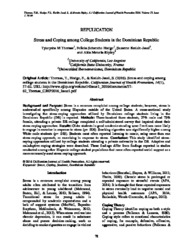Por favor, use este identificador para citar o enlazar este ítem:
http://cris.unibe.edu.do/handle/123456789/12| Campo DC | Valor | Lengua/Idioma |
|---|---|---|
| dc.contributor.author | Mencía-Ripley, Aída | - |
| dc.date.accessioned | 2019-12-02T21:20:42Z | - |
| dc.date.available | 2019-12-02T21:20:42Z | - |
| dc.date.issued | 2017 | - |
| dc.identifier.citation | Californian Journal of Health Promotion, 15(1), 78-84 | - |
| dc.identifier.uri | https://cris.unibe.edu.do/handle/123456789/12 | - |
| dc.description.abstract | Background and Purpose: Stress is a common complaint among college students; however, stress is understudied specifically among Hispanics outside of the United States. A cross-sectional study investigating the stress-coping approaches utilized by Dominican college students living in the Dominican Republic (DR) is reported. Methods: Three-hundred three students, 27% male and 73% female, attending a private DR college completed a self-administered survey that inquired about their stress-coping approaches. Results: Older students in good academic standing were five times more likely to engage in exercise in response to stress (p= .006). Smoking cigarettes was significantly higher among White male students (p= .018). Students most often reported listening to music, using more than one stress-coping approach, or exercising in response to stress. Conclusion: This study identified stresscoping approaches utilized by college students attending a private university in the DR. Adaptive and maladaptive coping strategies were described. These findings differ from findings reported in studies conducted among other Hispanic college student populations that more often reported social support as a more commonly-used stress-coping approach. | en |
| dc.language.iso | English | - |
| dc.relation.ispartof | Californian Journal of Health Promotion | - |
| dc.rights.uri | https://creativecommons.org/licenses/by/4.0/ | - |
| dc.subject | Ciencias Sociales | - |
| dc.title | Stress and coping among college students in the Dominican Republic | en |
| dc.type | Journal Article | - |
| dc.rights.license | Creative Commons 4.0 international license (CC-BY 4.0 intl) | - |
| dc.identifier.doi | 10.32398/cjhp.v15i1.1893 | - |
| dc.contributor.affiliation | Decanato de Investigación e Innovación (DII) | - |
| dc.relation.issn | 1545-8725 | - |
| dc.description.volume | 15 | - |
| dc.description.issue | 1 | - |
| dc.description.startpage | 78 | - |
| dc.description.endpage | 84 | - |
| dc.subject.keywords | Stress | en |
| dc.subject.keywords | Coping | en |
| dc.subject.keywords | Students | en |
| dc.subject.keywords | Dominican Republic | en |
| dc.contributor.authors | Thomas, T. | - |
| dc.contributor.authors | Hodge, F. | - |
| dc.contributor.authors | Kotkin-Jaszi, S. | - |
| dc.contributor.authors | Mencía-Ripley, Aída | - |
| dc.typeofaccess | Open Access | - |
| item.openairecristype | http://purl.org/coar/resource_type/c_18cf | - |
| item.cerifentitytype | Publications | - |
| item.grantfulltext | open | - |
| item.fulltext | Con texto completo | - |
| item.openairetype | Journal Article | - |
| item.languageiso639-1 | English | - |
| crisitem.author.dept | Vicerrectoría de Investigación e Innovación | - |
| crisitem.author.parentorg | Universidad Iberoamericana (UNIBE) | - |
| Aparece en las colecciones: | Publicaciones del DII-UNIBE Publicaciones indexadas en Scopus / Web of Science | |
Ficheros en este ítem:
| Fichero | Descripción | Tamaño | Formato | |
|---|---|---|---|---|
| 2017. Mencia-Ripley. Stress and copying_OA.pdf | Republication Full text [open access] | 227.83 kB | Adobe PDF |  Visualizar/Abrir |
Este ítem está sujeto a una Licencia Creative Commons

